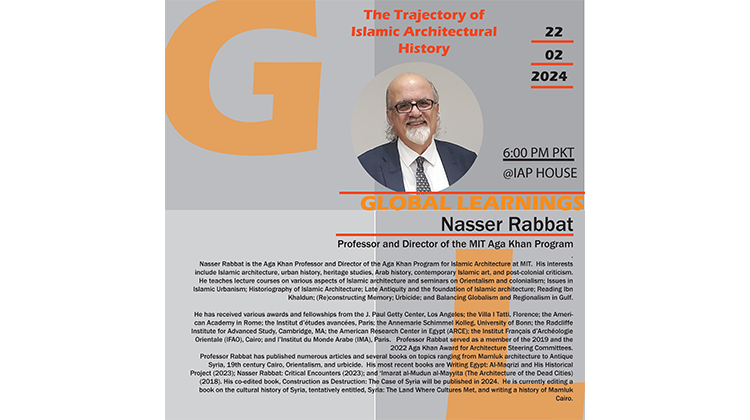Nasser Rabbat: The Trajectory of Islamic Architectural History

Nasser Rabbat is the Aga Khan Professor and Director of the Aga Khan Program for Islamic Architecture at MIT. His interests include Islamic architecture, urban history, heritage studies, Arab history, contemporary Islamic art, and post-colonial criticism.
He teaches lecture courses on various aspects of Islamic architecture and seminars on Orientalism and colonialism; Issues in Islamic Urbanism; Historiography of Islamic Architecture; Late Antiquity and the foundation of Islamic architecture; Reading Ibn Khaldun; (Re)constructing Memory; Urbicide; and Balancing Globalism and Regionalism in Gulf.
He has received various awards and fellowships from the J. Paul Getty Center, Los Angeles; the Villa | Tatti, Florence; the American Academy in Rome; the Institut d'études avancées, Paris; the Annemarie Schimmel Kolleg, University of Bonn; the Radcliffe Institute for Advanced Study, Cambridge, MA; the American Research Center in Egypt (ARCE); the Institut Français d'Archéologie Orientale (IFAO), Cairo; and l'Institut du Monde Arabe (IMA), Paris. Professor Rabbat served as a member of the 2019 and the 2022 Aga Khan Award for Architecture Steering Committees.
Professor Rabbat has published numerous articles and several books on topics ranging from Mamluk architecture to Antique Syria, 19th century Cairo, Orientalism, and urbicide. His most recent books are Writing Egypt: Al-Maqrizi and His Historical Project (2023); Nasser Rabbat: Critical Encounters (2023); and 'Imarat al-Mudun al-Mayyita (The Architecture of the Dead Cities) (2018). His co-edited book, Construction as Destruction: The Case of Syria will be published in 2024. He is currently editing a book on the cultural history of Syria, tentatively entitled, Syria: The Land Where Cultures Met, and writing a history of Mamluk Cairo.


